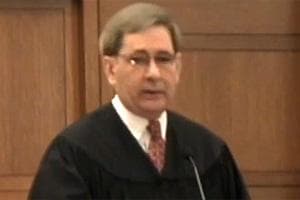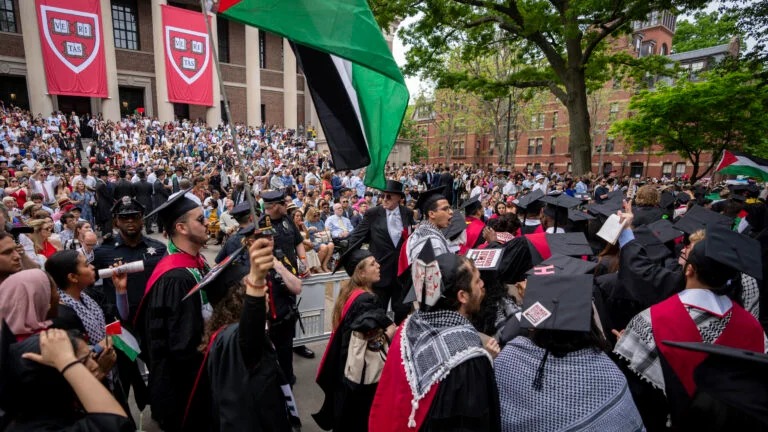|
Getting your Trinity Audio player ready...
|
Edited by: Fern Sidman
Harvard University, one of the most prestigious academic institutions in the world, is now at the center of a legal battle as a group of Jewish students has filed a lawsuit accusing the Ivy League school of allowing antisemitism to thrive on its campus. According to a Reuters report on Wednesday, this case has garnered significant attention, particularly after U.S. District Judge Richard Stearns in Boston ruled on Tuesday that the lawsuit could proceed, finding the accusations against Harvard to be plausible.
The lawsuit was brought forward by Jewish and Israeli students who claim that Harvard has become a hostile environment for them, with rampant anti-Semitism going unchecked by the administration. The students allege that they have faced severe and pervasive harassment, leading them to fear for their safety. Reuters reported that according to the complaint, this harassment has included both pro-Hamas activities and anti-Jewish rhetoric that the students believe crossed the line from free speech into hate speech and intimidation.

The students argue that Harvard has been “deliberately indifferent” to their plight, failing to take appropriate action to protect them from harassment and discrimination. The report in Reuters said that this indifference, they claim, has allowed an atmosphere of hostility to develop on campus, making it difficult for Jewish and Israeli students to participate fully in university life.
In his ruling, Judge Stearns acknowledged the gravitas of the allegations, stating that the facts presented by the students suggest that Harvard “failed its Jewish students.” While Stearns did not rule on the merits of the case, his decision allows the lawsuit to move forward, signaling that the students’ claims are substantial enough to warrant further legal examination, according to the information provided in the Reuters report.
One of the key points in the judge’s ruling was his skepticism about Harvard’s potential defense under the First Amendment. As indicated in the Reuters report, Stearns expressed doubt that Harvard could successfully argue that some of the pro-Palestinian or anti-Jewish activities on campus were protected by the Constitution’s guarantee of free speech. “To conclude that the [complaint] has not plausibly alleged deliberate indifference would reward Harvard for virtuous public declarations that for the most part, according to the [complaint], proved hollow,” Stearns wrote, the report added.
The lawsuit seeks an injunction to stop Harvard from violating Title VI of the Civil Rights Act of 1964, which prohibits discrimination based on race, religion, and national origin in institutions that receive federal funding. Noted in the Reuters report was that if the students succeed, Harvard could be compelled to make significant changes to how it handles complaints of discrimination and harassment.
Harvard and its legal team have not yet responded to the judge’s ruling or the allegations in the lawsuit. However, Reuters reported that the decision has sparked a broader discussion about the responsibilities of universities to protect students from discrimination while also upholding free speech rights.

Marc Kasowitz, the attorney representing the Jewish students, emphasized the severity of the situation, stating in an interview that Harvard’s conduct has been egregious and necessitates the changes sought in the lawsuit. “Jewish students on campus were treated horrendously by other student groups, by administrators, and by faculty who were very, very pro-Hamas and very, very anti-Semitic,” Kasowitz said, according to the Reuters report.
Kasowitz added: “We are gratified that the Court has upheld our clients’ civil rights claims against Harvard, finding that the ‘facts as pled show that Harvard failed its Jewish students’ and that Harvard’s ‘virtuous public declarations…proved hollow when it came to taking disciplinary measures against offending students and faculty.’ We intend to continue to take all necessary and appropriate steps to protect Harvard’s Jewish students, the first step being discovery of Harvard’s internal files and communications to prove the full nature and extent of Harvard’s failures.”
The legal team representing the Jewish students from the New York based firm of Kasowitz Benson Torres include Marc E. Kasowitz, Daniel R. Benson, Mark P. Ressler, Andrew L. Schwartz, and Joshua E. Roberts. The team also includes associates Andrew C. Bernstein, Jillian R. Roffer, Emily Lowe, William Wolfe Taub, Zachary N. Josephs, Brittany F. Alzfan, Yarden N. Hodes, Erin Ringel, Paulina Flores Elizondo, and Alfredo J. Fernández Torres.
Kasowitz Benson Torres LLP is a leading national law firm with a core focus on commercial litigation, complemented by exceptionally strong bankruptcy/restructuring, employment, and real estate transactional practices. Kasowitz is known for its creative, aggressive litigators and willingness to take on tough cases. The firm has extensive trial experience and is always trial-ready, representing both plaintiffs and defendants in every area of litigation.
The case against Harvard underscores the growing tension on college campuses across the United States, where debates over Israel and Palestine often spill over into broader issues of anti-Semitism and free speech. The outcome of this lawsuit could set a significant precedent for how universities handle similar complaints in the future, particularly those involving complex intersections of political activism, free expression, and the protection of students from discrimination.
This lawsuit is not occurring in isolation. Across the country, there has been an increase in reports of anti-Semitism on college campuses, often linked to Israel-Hamas war.

The lawsuit against Harvard was filed just eight days after the resignation of President Claudine Gay, who had come under intense scrutiny for her handling of anti-Semitism on campus, as well as separate allegations of plagiarism, according to the information contained in the Reuters report. The timing of the lawsuit suggests a deep-seated frustration among students and faculty over the administration’s clear cut failure to address anti-Semitic behavior effectively.
The plaintiffs in the lawsuit accuse Harvard of selectively enforcing its anti-discrimination policies, thereby failing to protect Jewish students from harassment and intimidation. Reuters reported that according to the complaint, Jewish students were frequently maligned as “murderers” and “colonizers” and were subjected to offensive chants such as “from the river to the sea,” a slogan often interpreted as calling for the elimination of Israel.
Furthermore, the Reuters report indicated that the lawsuit alleges that Harvard ignored repeated pleas from Jewish students for protection and went so far as to hire professors who openly advocated anti-Jewish violence and disseminated anti-Semitic propaganda.
One particularly troubling incident cited in the lawsuit involved a Harvard Law Review editor who allegedly assaulted a Jewish student during a pro-Palestinian “die-in” protest. Indicated in the Reuters report was that despite the seriousness of the allegations, the editor was allowed to resume work as a teaching fellow, a decision that the plaintiffs argue reflects the administration’s indifference to the safety and well-being of Jewish students.
Harvard is not alone in facing such accusations. In recent months, similar cases have been settled by other prestigious institutions. Last month, Brown University and New York University both reached settlements in cases that accused them of failing to address anti-Semitism on their campuses, as was revealed in the Reuters report. In the case concerning New York University, the Jewish students there were also represented by the Kasowitz Benson Torres firm. These settlements, while not admitting wrongdoing, typically involve commitments to improve campus safety, revise policies, and sometimes financial compensation for the plaintiffs.
Columbia University also found itself embroiled in controversy over the safety of its Jewish students. The Reuters report explained that in June, Columbia agreed to provide safety escorts and implement other measures to settle a lawsuit that claimed the campus had become unsafe due to a pro-Hamas encampment on the school’s main quad. This encampment was eventually dismantled after the April 30 arrest of dozens of protesters who took over a nearby academic building.
These cases highlight a troubling trend: universities, which are supposed to be bastions of free speech and intellectual diversity, are increasingly being accused of fostering environments where anti-Semitism can flourish under the guise of political activism.
In June, two Harvard task forces—one focused on anti-Semitism and the other on anti-Muslim bias—released their findings, painting a troubling picture of intolerance that affects individuals across the ideological spectrum, including those with pro-Hamas and pro-Israel views, as was noted in the Reuters report.
The task force on anti-Semitism found that Harvard’s campus was rife with discrimination against Jewish students. Reports of harassment and intolerance underscored the need for immediate action to create a safer and more inclusive environment. Detailed in the Reuters report was that the task force recommended several measures, including mandatory anti-harassment training for students and initiatives to ensure a “welcoming environment” for religiously observant Jewish students. These recommendations seek to address the specific challenges faced by Jewish students, who have reported feeling marginalized and unsafe in an increasingly hostile campus climate.
Simultaneously, the task force on anti-Muslim bias highlighted significant concerns regarding the treatment of students who support Palestinian causes. Reuters reported that the task force called for measures to prevent the “doxxing” of these students—an alarming trend where personal information is publicly shared online to intimidate or harass individuals. Additionally, the task force emphasized the need for clear school policies to combat bullying and bias, ensuring that all students can express their views without fear of retribution or discrimination.
Reuters reported that in response to these findings, then-interim Harvard President Alan Garber issued a message to the university community, urging members to “strengthen our ties with a sustained commitment to engaging each other with tact, decency, and compassion.” Garber’s message highlighted the university’s need to address the deep divisions within its community and to foster a culture of mutual respect and understanding. His call to action emphasized the importance of institutional accountability in addressing these systemic issues.
On August 2, Garber’s leadership was solidified as Harvard removed the “interim” from his title, making him the official president of the university. This move signals the administration’s confidence in Garber’s ability to lead Harvard through this challenging period and implement the necessary changes recommended by the task forces.





